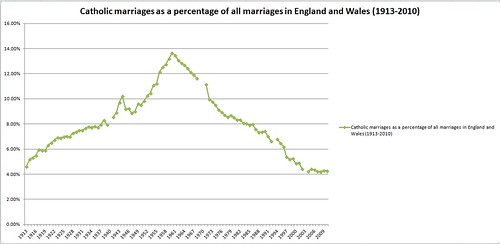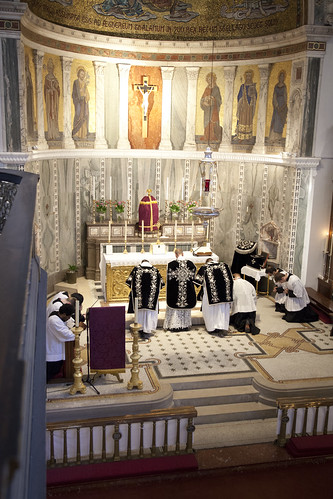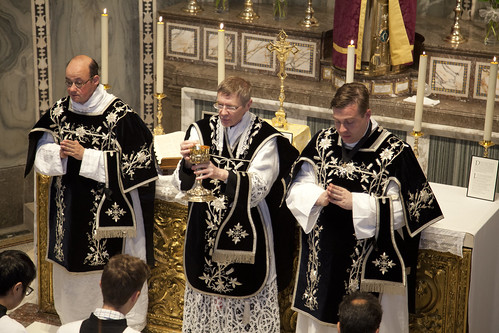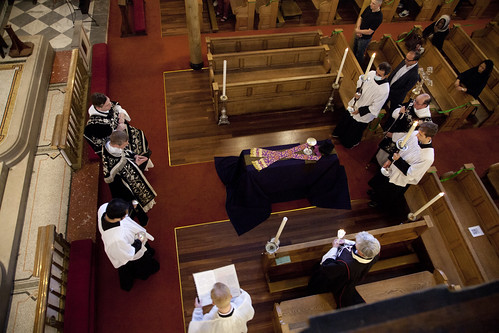Chairman's Blog
Fr Thomas Reese on Traditionis Custodes: fisked
(Cross-posted from Rorate Caeli)
Fr Reese's column is here. My comments in red.
Despite the recent decision of Pope Francis to curtail celebration of the Latin Mass, we are not going to see it disappear anytime soon for a simple reason: Local bishops can and will still permit it.
This is true
Francis' new rules on the old liturgy were laid out in Traditionis Custodes on July 16.
Unlike his predecessor, Pope Emeritus Benedict XVI, Francis is no fan of the pre-Vatican II liturgy. Like Pope Paul VI and most people in the church, Francis welcomed the liturgical reforms enacted by the Second Vatican Council (1962-1965) and believed the old liturgy would gradually fade away as Catholics who were raised with it died off.
Would ‘most people in the Church’ include the 50% or so who stopped going to church? Statistics of church attendance are unreliable but here’s something easy to count: marriage.
In 1981, a survey of bishops by the Congregation for the Sacraments and Divine Worship found that only 1.5% of the bishops said their priests and people were in favor of making greater allowance for the Tridentine rite, as the old, pre-conciliar Latin Mass is called. (The post-conciliar version approved by Paul VI was written in Latin but then translated into the vernacular for common use around the world.)
What does this show? That only 1.5% of bishops thought seriously about the pastoral care of the Catholics attached to the Traditional Mass in their dioceses. Not quite as flattering to Fr Reese’s case as he imagines.
Benedict, though, had experienced great spiritual nourishment in the old liturgy and hoped that allowing its greater use would foster church unity, especially with those who found change difficult. But he also wanted to provide the old liturgy to those young people who were attracted to it.
I hope all the prelates of Pope Benedict’s generation experienced this nourishment, otherwise they would hardly have become priests in the first place.
When local bishops were reluctant to allow widespread use of the old liturgy, Benedict sidelined them, giving every priest the right to celebrate the old Latin rite even if his bishop opposed it.
Benedict also went a step further. He declared that the new and old liturgies were of equal standing in the church. Thus, there was no need for the old liturgy to fade away as anticipated by Paul VI.
Benedict's hope to foster unity failed. Those who went into schism because of the council, like the Society of St. Pius X, would not come back simply because they were allowed to say the old Mass. They are still in schism despite the efforts of Paul VI, John Paul II, Benedict XVI and Francis.
This is not true: a significant number of priests returned to unity under the Pope, having been in or associated with the SSPX until 2007. In the UK we have the Sons of the Most Holy Redeemer; in Germany the Institute of St Philip Neri in Berlin; in France the Institute of the Good Shepherd, all from the Summorum Pontificum era. A previous set of priests were reconciled under Ecclesia Dei Adflicta,notably the Fraternity of St Peter and a number of French religious communities. The ‘sunshine policy’ worked.
There are others who remain in the church but who champion the Latin Mass as a symbol of their rejection of all the reforms that came from the Second Vatican Council. These ideologues argue that the new Mass is an abomination, that ecumenism is a betrayal of tradition and interreligious dialogue is satanic. They believe that only they are the true church and everyone else is in error.
I challenge Fr Reese to give one single example of a figure of any significance associated with the Traditional Mass under Summorum Pontificum who uses this language. On the contrary, it should be obvious that ecumenism and interreligious dialogue will be impossible under Tradionis Custodes. How’s it going to work? ‘We really appreciate and respect your (Hindu, Buddhist, Muslim, Orthodox) use of sacred languages not understood by the worshipper, your tradition of chant, your penitential practices: we just fear and loath our own! Oh, and you Protestants: the Pope doesn’t exercise despotic power, that’s a misunderstanding. Just give me a moment while I crush these trads under my booted heel…’
By bolstering these dissidents, Benedict's efforts for church unity backfired. This view was confirmed by a detailed consultation with the world's bishops by the Congregation for the Doctrine of the Faith.
Except that it wasn’t. Everyone who has actually seen the results confirms that they were mixed, with many bishops pleased with the results of Summorum Pontificum. The one piece of direct evidence in the public domain, the French bishops’ summary, is quite negative but still accepts the Traditional Mass as a fact of life. Their response to Traditionis Custodes has been to reassure Traditional Catholics of their ‘esteem’. They are perfectly aware of where the threat to the unity of the Church comes from.
Those who went into schism because of the council, like the Society of St. Pius X, would not come back simply because they were allowed to say the old Mass. They are still in schism despite the efforts of Paul VI, John Paul II, Benedict XVI and Francis.
You’ve done this bit. Don’t they have editors at NCR?
Congregations that celebrate the old Mass today have become rallying centers for those fomenting opposition not only to the council reforms but to Francis' papacy. Not only do they oppose the reforms, they also spread their dissent to those who simply come to find spiritual nourishment in the old liturgy.
No, they have become decompression chambers for people traumatised by the crisis in the Church, where they can calm down, remain in the unity of the Church, and receive pastoral care and the sacraments.
The challenge that Francis now faces is how to separate the pious faithful with traditional devotion to the old liturgy from the ideologues who reject the reforms of the council.
His solution is to empower local bishops with the authority to separate the sheep from the goats. He has returned to bishops their traditional authority over the liturgy that is celebrated in their dioceses, the same authority they had under John Paul II. The bishops can still allow the celebration of the old Mass where they judge there is a pastoral need, but they can deny it to dissenters who oppose the reforms of Vatican II.
Since, on Reese’s view, they are mixed together like the tares and the wheat, how exactly is that going to work? Are they going to be interrogated? Is a diocesan official going to take screen-shots of their social media postings?
The bishop can also control which priests are celebrating the old Mass to make sure that they are fostering unity with the church rather than dissent. According to Francis, these priests should be "animated by a lively pastoral charity and a sense of ecclesial communion."
However, Francis does reserve to the Vatican permission for newly ordained priests to celebrate the old liturgy. He worries about young priests and seminarians who only want to celebrate the old liturgy. He wants to make sure that they understand that they are being ordained for the whole church, not just a small faction within it.
Here is an interesting admission that of the many vocations prompted by the Traditional Mass, a goodly portion do not go to the exclusively Traditional Institutes and communities. If Reese wants priests who celebrate both Forms, he should rejoice that these young men are joining their diocesan seminaries to learn how to celebrate the Novus Ordo.
Likewise, he has told bishops not to authorize new parishes or new groups for the sole use of the old Mass.
Francis has also reversed Benedict's decision to give equal standing in the church to the pre- and post-Vatican II liturgies. According to Francis, the new liturgy is the only liturgy of the church, and the old liturgy is only allowed temporarily for pastoral reasons.
But that’s a contradiction, isn’t it? How can the Novus Ordo be the ‘only liturgy’ and at the same time there is another one, albeit allowed only temporarily? If it’s being said with the permission of the Pope and the Bishops, it is legitimate. And what about all the other Rites and Usages? Are the Carthusians going into schism? And the Greek Catholics?
Francis has also mandated that the Scriptures at these Masses be read in the vernacular, not Latin. Perhaps he hopes to gradually introduce the vernacular into these liturgies in the future.
What he has mandated has commonly been done for a century or more: the reading of the lections in the vernacular after their proclamation in Latin.
In any case, once again, it is the official position of the church that the old liturgy should fade away.
Will it fade away? Not quickly.
Many bishops have already announced that there will be no immediate change in their dioceses. This is smart. Pastoral practice demands that the bishop have a dialogue with their communities before making any decision. Those who are spiritually attached to the old liturgy should be treated with compassionate sensitivity and separated from those who foment rebellion.
If they examined Catholics attending the Novus Ordo on their orthodoxy, they'd have to decide what to do with the 70% (yes you read that correctly) who don't believe in the Real Presence. I'd be fascinated to know what Novus Ordo Catholics believe about the authority of the Pope, or the binding nature of Vatican II.
Those who are young must be educated to the deeper meaning of the Eucharistic reforms and encouraged to go to the new liturgy. They need to understand the communal and participatory aspects of liturgy. We come together not simply for our individual devotion but to worship as a community of disciples who are called to help establish God's kingdom on earth.
Whereas in the Traditional Mass we come together with the saints of all the ages and Catholics all over the world to offer to the Father one and the same sacrifice of Christ on the Cross, using the very same words. Even Annibale Bugnini, the architect of the Novus Ordo, conceded that those who objected to his reforms did so, in part, precisely because of the lack of unity it presented. Pope John Paul II made the same point. Dominicae Cenae (1980) 80:
Nevertheless, there are also those people who, having been educated on the basis of the old liturgy in Latin, experience the lack of this “one language,” which in all the world was an expression of the unity of the Church and through its dignified character elicited a profound sense of the Eucharistic Mystery
Local bishops can also point out that saying the Mass in Latin is not a problem if it is the Latin version of the new rite. It is the old liturgy that is used to breed disunion.
But we all know that priests who have tried to offer the Novus Ordo in Latin have been subject to official disapproval and even persecution, sometimes more severe than that meted out to Traditionalists. The Latin Novus Ordo has been effectively banned from St Peter’s, even while the EF was given a tiny space in which to continue. In many places no Latin is taught in seminaries, and now we’ve been told that the Latin edition of the Novus Ordo Missal will not be reprinted. How are these Masses going to be celebrated, Fr Reese, without a Missal?
The need for pastoral sensitivity means that it will take time for old liturgy to fade away, but this ultimately is the goal.
When my mother was alive, she used to go to the Saturday evening Mass at her parish. One Saturday she showed up and the Mass was in Spanish. She kept going to that Mass even though she did not know a word of Spanish. When I asked her why, she responded, "It is wonderful, just like the old Latin Mass. I don't understand a word they are saying." Then she added, "It is even better, I don't understand the homily."
Fr Reese would do well to reflect on the meaning of this anecdote, and not just use it as a gag-line. It tells us something about the suffering of Catholics under liturgical abuses and the preaching of novelties and nonsense from the pulpit, and the possibility of spiritual participation in the Mass.
Thomas Reese
Jesuit Fr. Thomas Reese's column for Religion News Service, "Signs of the Times," appears regularly at National Catholic Reporter.
Traditionis Custodes and Families
The practical effects of Pope Francis’ new Apostolic Letter will no doubt vary from place to place, but one thing is clear: at the highest level, the pastoral solicitude of Pope John Paul II and above all of Pope Benedict XVI, towards Catholics attached to the ancient liturgical tradition, has been replaced at the highest level of the Church by an attitude of suspicion, and even of hostility.
I started attending the Traditional Mass in 2002, and so I had a taste of life before Pope Benedict. Ordinary Catholics, even quite conservative ones, would literally recoil in horror when they heard that I was attending the ancient Mass, regardless of the fact that it had the approval of the local bishop and was celebrated by a priest in good standing in the Church. Ferocious attacks on us appeared in mainstream and, again, conservative Catholic publications. This continued for some time even after 2007, but as time has worn on it has become less and less of a problem.
Marian Franciscan Vocations retreat, August
Who is Pope Francis punishing?
In his Apostolic Letter Traditionis Custodes and its covering letter, Pope Francis is introducing stringent new restrictions on the celebration of the ancient Latin Mass, now called not the Extraordinary Form but simply the 1962 Missal or “earlier Missal.”
Pope Francis writes, in the letter, that the use of the 1962 Missal is
often characterized by a rejection not only of the liturgical reform, but of the Vatican Council II itself, claiming, with unfounded and unsustainable assertions, that it betrayed the Tradition and the “true Church”.
Pope Francis indicates that this concern, and the desire for measures such as those he has adopted, has been expressed by bishops responding to the survey on the implementation of Summorum Pontificum which the Congregation for Divine Worship carried out in 2020. This is very surprising, since those who had sight of the results consistently reported that a great many bishops were positive about the place of the Old Mass in their diocese. Even the French bishops, whose rather negative collective response was leaked, had to acknowledge many positive aspects of the phenomenon, and concludes that “if it [Summorum Pontificum] honors a principle of reality, then a tireless work of unity is always necessary.” What the French bishops had in mind, to assist this “work of unity,” was things like reconciling the calendar and lectionary, issues which Pope Francis has not broached.
Read the whole things there.
Some Comments on the Apostolic Letter Traditionis Custodes
This has already gone out by email to LMS supporters.
This document will be a grave disappointment to those many priests and lay Catholics who responded to the words of Pope St John Paul II and Pope Benedict XVI, who encouraged the use of the earlier liturgical tradition, calling it a ‘rightful aspiration’ and ‘riches’ for the Church, respectively. These Catholics have worked hard over many years, particularly since 2007, to build up the unity of the Church, which as the Second Vatican Council declared does not depend on liturgical uniformity but on unity of faith under the Pope (Sacrosanctum Concilium 37; Orientalium Ecclesiarum 2).
The provision that the EF not be celebrated in parish churches appears entirely unworkable, in the context of the careful provision which has been made over many years by bishops all over the world.
The overall negative judgement of the EF and the communities which attend it seems wholly unwarranted, and we would challenge any apologist for this document to produce real evidence that the EF has undermined the unity of the Church, compared, say, to the celebration of Eastern Rites in the West, the special liturgical celebrations of the Neocatechumenate, or the great variety of liturgical styles found in the context of the Ordinary Form of the Roman Rite.
In detail, looking at the provisions of the document:
Art 1: This appears to overturn Pope Benedict XVI’s claim that the Roman Rite can be considered as having two ‘Forms’, Ordinary and Extraordinary. The document adopts the terminology of ‘the 1962 Missal’.
Art 2: This rolls back the presumption of authorisation for the 1962 Missal which was created by Summorum Pontificum in 2007. However, that claim was based on the fact that the older Missal had never been abrogated. Since this document does not formally abrogate it, this creates a legal anomaly.
Art 3.1: the insistence that groups attending EF accept, in some sense, the ‘validity and legitimacy’ of the reformed Mass is reminiscent of earlier documents (e.g. the Indult of 1984). This seems no more than an empty gesture, however, since now as formerly it is impossible to know how bishops would go about enforcing this.
Art 3.2: in practice bishops all over the world have, on their own initiative or by approving the initiative of their priests, designated where the old Mass can be celebrated. The insistence that these places not be parish churches, and that they not erect any further personal parishes, would seem to present bishops with an unnecessary problem.
Many parishes contain ‘chapels of ease’, the oratories of religious communities, and other places of worship, as well as parish churches, but it is obscure what advantage would be had, from any point of view, in transferring celebrations of the 1962 Missal to such locations.
Art 3.3: similarly, bishops have already in practice ‘designated’ when the 1962 Missal is celebrated, as they know about, and at least by implication permit, all the public celebrations of Mass in their dioceses. It should also be noted that the Epistle and Gospel are commonly read in the vernacular at 1962 celebrations, and that this document does not forbid them from being proclaimed in Latin as well, which is what normally happens.
Art 3.4, Art 5: these re-establish the system in place before 2007 when bishops had to permit priests to celebrate the 1962 Missal. Once again, however, bishops today know and by implication permit their priests to do this, since they assign them to parish ministry or to some other task in this knowledge. Expecting priests to apply for this permission (Art 5) again will be for many priests and bishops a pointless bureaucratic exercise.
Art 3.5: Bishops always have the power to regulate and, for sufficient reason, to close down, pastoral activities in their dioceses. What this, and many other provisions of this document, appear to establish, however, is a hermeneutic of suspicion towards the 1962 Missal and those who celebrate or attend it: almost, that they be regarded as guilty until proven innocent.
Art 3.6, Art 4: To remove the bishops’ power to establish new groups, and to permit newly ordained priests to celebrated the 1962 Mass, seems to contradict the document’s insistence on bishops’ authority and discretion.
Art 6 and 7: these effectively abolish the authority of the Congregation of the Doctrine of the Faith for matters connected with the 1962 Missal, which was reiterated only a short time ago when Pope Francis amalgamated the Pontificum Commission Ecclesia Dei with the CDF.
If implemented rigorously, this document will seriously disrupt long-established celebrations of the older Missal, and will drive a great many faithful Catholics, who desire nothing more than to attend the ancient Mass in communion with their bishops and the Holy Father, to attend celebrations which fall outside the structures of the Church, above all those of the Society of St Pius X.
Joseph Shaw, Chairman of the Latin Mass Society
Requiem for Fr Anthony Conlon
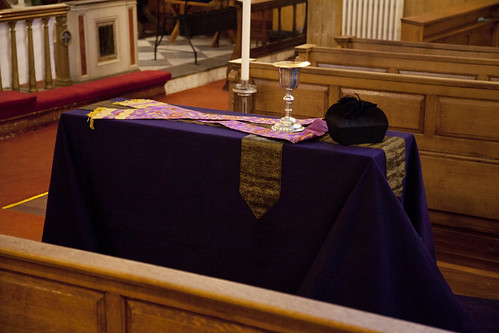 |
| As a priest, the catafalque (coffin stand with pall, representing the body) has a chalice and paten, and biretta, on it. |
It was accompanied by the Cantores Missae under the direction of Charles Finch. They sang the Missa Defunctis of Giovanni Francesco Anerio (1567-1630), for four voices. This setting is unusual in including the Dies Irae, which can otherwise be sung to the chant setting: Anerio's setting alternates chant and polyphony line by line. The Cantores Missae also sang Anerio's setting of the Libera me, the moving chant which precedes the blessing of the catafalque: his polyphonic setting is superb, and not often sung because of its length.

Warwick Street has a regular Wednesday evening Sung Mass (6:30pm), usually accompanied by chant.
We will not fail to remember them--as St Monica urged her son St Augustine to do--at the Altar.
Concelebration: a new front in the liturgy wars?
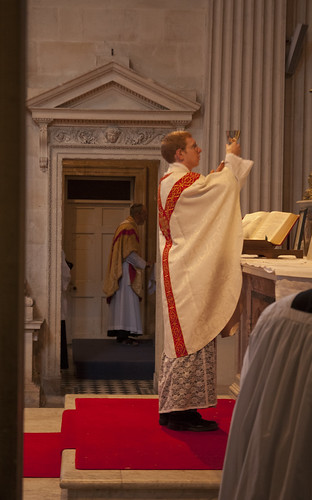 |
| Individual Masses at the LMS Priest Training Conference in Prior Park a few years ago. |
The celebration of priests together, when two or more priests celebrate one Mass, has long caused controversy. For decades after the Second Vatican Council priests have felt under pressure to take part in “concelebrated” Masses instead of celebrating their own Mass, perhaps without a congregation. Concelebration is now being enforced in St Peter’s Basilica in Rome, ending the long tradition of large numbers of priests celebrating individually at side altars. Now concelebration is being used as a weapon against priests who celebrate the Traditional Latin Mass: the Archbishop of Dijon, Roland Minerath, is ending the 23-year-old apostolate of the Fraternity of St Peter in the Archdiocese because the priests serving it prefer not to concelebrate.
Many bishops, religious superiors and seminary rectors like concelebration, as it gives them effective power over the celebration of Mass by their priest subordinates. They can insist that these priests not only attend a “conventual” or “community” Mass when priests are gathered together, but do so in a way which prevents them from celebrating a Mass of their own. When there is a large number of priests, most of them have hardly anything to do in concelebration, and of course they have no control over it: they can’t celebrate it at an earlier or later time, in a chapel with special significance to them, or using liturgical options of their choice, such as a votive Mass. Concelebration is a control-freak’s dream.
Who is afraid of the Traditional Mass?
My latest on LifeSite.
On Sunday July 3, the FIUV — the International Una Voce Federation — took out an advert in the Rome edition of the Italian newspaper La Repubblica, to make a statement about the Traditional Latin Mass. It points out:
“The growth of interest in the traditional liturgy is not due to nostalgia for a time we do not remember, or a desire for rigidity: it is rather a matter of opening ourselves to the value of something that for most of us is new, and inspires hope.”
That it is controversial to be attached to the liturgy used by the Church for more than a dozen centuries is the sign of a deep malaise in the Church. Two prominent prelates in the Roman Curia have recently been reported making remarks about the Extraordinary Form (EF) of extraordinary hostility, and these have come after weeks of speculation about a new official document which will in some way roll back the freedom which Pope Benedict XVI gave to the more ancient liturgy in 2007.Possibly all these stories and rumors are false or taken out of context — the Vatican can seem like a hall of mirrors sometimes — but the mere fact that these stories are circulating is a reminder that the Old Mass has determined enemies in Rome.
Read it all there.
Support the Latin Mass Society
Statement from the FIUV
The Una Voce Federation has taken out an advert in the mass-circulation Italian daily newspaper La Repubblica, appearing today Sunday 4th July.
The English text is as following (for other languages see here):
The International Federation Una Voce (FIUV), founded in 1965, brings together associations of the lay faithful attached to the Extraordinary Form of the Roman rite (the Traditional Latin Mass).
In 2007, the Apostolic Letter Summorum Pontificum recognised the vitality of the traditional liturgy, the freedom of priests to celebrate it, and of the faithful to request it. This has led to an ongoing increase in the number of celebrations of the ancient Latin Mass, and of its spiritual fruits.
During 2020 the FIUV conducted a worldwide survey of the faithful on the implementation of Summorum Pontificum. From this survey, which included results from 364 dioceses in 52 countries, we found:
• The ancient Latin Mass is deeply appreciated by groups of faithful of all ages, especially families with children, young people and converts, found in all social and cultural environments, on all continents and in an ever increasing number of countries.
• In many areas the increased availability of this Mass has favoured the normalisation of relations between the faithful attached to it and their bishops, relations increasingly characterised by mutual understanding and respect.
Nevertheless, we have noticed that, contrary to the previous policy of the Holy See, there are still people within the Church, including some bishops, who would like to see the Extraordinary Form of the Roman rite explicitly suppressed, or subject to further restrictions. For this reason, the FIUV, in view of the faithful who adhere to the Latin Mass, feels the duty to express its opinion, encouraged by Pope Francis' exhortations to the members of the Church to use parrhesia with the necessary humility.
The growth of interest in the traditional liturgy is not due to nostalgia for a time we do not remember, or a desire for rigidity: it is rather a matter of opening ourselves to the value of something that for most of us is new, and inspires hope. Pope Francis has characterised the ancient liturgy in terms of a "sense of adoration" (Press conference of 28 July 2013), we can also apply his words to it: a "living history that welcomes us and pushes us forward" (Evangelii Gaudium 13).
Today we only wish to be part of that "great orchestra" of "unity in variety" which, as Pope Francis said (General Audience of 9 October 2013), reflects the true catholicity of the Church. The Apostolic Letter Summorum Pontificum continues to transform the conflicts of the past into harmony: long may it to continue to do so.
Felipe Alanis Suarez, President www.fiuv.org
Ends
Some details from the international survey are set out in here.
Child sex-abuse: blaming the victims
 |
| Who will do reparation for the crimes our society so casually sweeps under the carpet? LMS Mass of Reparation for Abortion, Bedford |
...while the official message is that everyone has the right to say “no”, saying “no” is the mark of being uncool or actually a bad person. Schools have handed potential rapists a new and powerful arsenal of psychological techniques they can use to put pressure on their victims.
Of course, few teachers believe this message themselves: in its implications, it is an extreme form of sexual libertinism incompatible with long-term relationships and family life. What they actually think of the child-victims of the intense social pressure to agree to sexual acts is revealing. One testimony on Everyone’s Invited described how when boys shared nude photos of the girls with each other, it was the girls who were blamed from creating the images in the first place, at the insistence of their boyfriends.

